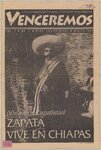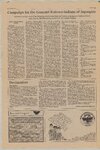| OCR Text |
Show ei 12 - VENCEREMOS WINTER 1994 For some, - claiming one 'S identity i:IS. 0 slow process Marco Leavitt “Hey Marco! Are you a wetback?” I was more confused than insulted. “What?” a spic.” heavy with the colorful fruit. There was also a young man hoc name 1 never She was told to look down. Her beautiful vision of learned, but who slammed a basketball into the wind- _ Shady, pleasant orchards was dashed. Strawberries don't The three of them were giggling. It was a dumb joke, shield of our car as we practiced parallel parking in - grow on trees. They grow in hot, sun-tortured fields, hidno dumber or crueler 1 suppose, than other kinds of Drivers Ed. den among the leaves of row upon row of tiny plants. taunts heard all the time in classrooms across the coun“Hey wetback! Come out here and 1'1] kick your ass!” Picking them is dirty, back-breaking work! ) try. Before moving to St. George, I wasn't accustomed to I love her stories. For me, they affirm that 1 have a Yeah, it was just a dumb joke, but on that day in regarding myself as a minority. My father was caucasian heritage. Although pioneer ancestors on my father's side . Dixie Junior High School, I was forced to realize that my and my skin isn't especially dark. Most people I think, were among those who settled southern Utah, 1 never skin was slightly darker than that of the other kids. The had until then merely assumed that I was quite tanned. felt a part of that St. George. I choose to connect with product of the whitest suburbs to be found in California I began for the first time during those years to talk my mother's heritage, a heritage which is hers, and also and Washington state, I was unsettled by the experience. with my mother about her past. Born in Durango, mine, and know that I have a place in the world — a The quest for identity is always difficult. For most, Durango, Mexico, she came to the United States as a place where l'm from. the journey only begins after a long period of introspec- young girl to live with relatives, and later took to crossIt feels good to be from somewhere. tion and questioning. The awakening comes slowly, ing the border at will, working odd jobs, and eventually For those of us who choose to be called Chicano, or advancing into adulthood as the summation of experiserving an LDS mission in Texas. Latino, or some other term, if we are to have any direc-. ences that taken together answer the question of “who Hearing the stories for the first time, I was struck by tion in our lives, it is especially important to embrace _ ami” the difficulties my mother has experienced. My next Our past. My search began not with a question, but rather with reaction was one of admiration. What incredible stories! Culture is what supports us and enables us to choose the abrupt realization of who I was not. Apparently 1 To me, a fourteen year old, her night-time crossings of our way. Without a stable base, it is impossible to move. wasn't white, and apparently that made a difference. HI. the Rio Grande, and. escapades picking produce in One becomes an inert object floating ¡ in a void of lost learned anything in school, it was that society valued Michigan, were as adventurous as any story written dy identity. physical differences. Robert Louis Stevenson. As a life-long resident of the west, 1 ps t really know - IT don't mean to suggest that during. my years in St. Of course, my mother hadn't been looking for ao Mexico. My connection with that country has been sevGeorge I was the continual victim of an entire student ture. She was driven on her way by a past of hardship ered, probably permanently. I can only try, as best 1 may, body of racists. The childhood experiences that haunt artd sadness. She came to the United States, as so many to appreciate the experiences of those who have gone our lives are generally more subtle than that. My claims do, gambling that maybe things there would be better. before me. As a Latino, I must also claim an identity of to racial persecution are founded mainly on the small, She laughs at her own naivete now. Once, enticed by promises of easy work and good pay, she traveled to Michigan to pick strawberries. “Where are the strawberries?” she asked upon arriving. She went to Three Rivers following a vision — beautiful orchards of strawberry trees, their branches my own in a land that doesn't always want to acknowledge my value. It is too late to answer my inquisitors from Junior High. I didn't know how to respond then, and now the opportunity is passed. If was able, I would tell them now what I should have told them then. Yes, lam a wetback. d daily reminders that I was an outsider. — by jokes that required apologies before they could be told. - “Two Mexicans were walking down this road ...” — by friends who mastered the king of all putdowns. A Chicana writer “put on this planet to remember and record” Last brings to mind the picture of a battlefield, a fierce day-to-day 197 pp. ost creative writers scoff at the idea of writing politi- cal poetry or fiction, as if literature and politics were inseparable categories. But Cherríe Moraga openly characterizes her poetry and prose as radical. Moreover, she insists that a distinction can- not be made between the political and the personal. This is precisely what makes Moraga's work so powerful — not her politics per se, but the courage and honesty with which she unabashedly - discloses so much about herself RS AS A AS and her culture. One could say that Moraga is not afraid of the A section of the book, “War Cry,” much like the title of an earlier book, “Loving in the War Years,” truth, even when the truth is tortuously painful. In The Last Generation, a Col lection of political essays, journal entries and poems, Moraga analyzes the many facets of her life as a Chicana lesbian writer and political activist. She explores the roles that ethnicity, sexuality and class play in the formation of her identity. Moraga's poetry challenges the traditional conceptions of the Chicana subject within the patriarchy and heterosexism of -Chicano culture. She defines her own sexuality: “Sí, soy una mujer velluda./ Sí, soy./ Y a mi me gustan las mujeres.” The poet establishes a literary space for working class lesbian women of color within a society that Oppresses them from multiple angles: sexism, heterosexism, racism and class. The tone of Moraga's voice is militant. The title of the second struggle for liberation on many fronts against a multi-headed monster of domination. For Moraga, to be a Chicana lesbian is to declare a symbolic war against the dominant patriarchal Anglo culture. In “The War Continues,” the poet writes, “Flesh is full/ of holes.// It is made/ to breathe/ secrete/ receive.// It is nothing/ against/ bombs/ and/ bullets.” Moraga calls herself “a Chicana writer. Not a MexicanAmerican writer, not a Hispanic writer, not a half-breed writer.” And to name one's own culture is self-empowerment, a “politic that refuses assimilation into the U:S. mainstream,” one that “acknowledges our mestizaje — Indian, Spanish, and Afrieano.” To be proud of one's culture is liberating. But she realizes that to gain political power, one cannot rely on ethnic unity alone. Moraga is living in San Francisco when the ES. imposes an economic embargo on Nicaragua. The Sandinistas are at war with the U.S.-backed Contras. Moraga attends a protest of Latinas/os imperialist ideology of de Latina/o protestors makes them political enemies rather than allies, in spite of their “brown faces.” Moraga has expectations for how her poetry ought to be read. “The Chicano scribe remembers, not out of nostalgia but out of hope. She remembers in order to envision... a world founded not on greed, but on respect for the sovereignty of nature.” But although Moraga does not consider her own writing to be nostalgic, one cannot help but sense how deeply she laments the loss of the Spanish language among new generations of Chicanas/os _— what she calls “the many small deaths” of a culture. Her nostalgia and nationalism make her writing reminiscent of literature written during the Chicano Movement of the 1960s. In this respect, it could be considered problematic by contemporary critics who now find nationalism to be a self-defeating strategy of resistance. Notwithstanding the potential problems with her politics, the poet instills in her writing a tremendous power of emotion. She compares her own life to the future of Chicana/os. By describing herself as a motherless woman who will not reproduce and is excited by seeing “so many brown faces,” but she soon discovers that the protestors are (“My family line stops with me”), the poet alludes to Chicana/os who forget their heritage, who in shouting, They favor the embargo. “Across effect have become culturally sterile. As a writer, however, the street, the “resistance” has Moraga feels empowered to repro- “Viva George Bush!” congregated — less organized, white, young, middle-class students.” Somewhat demoralized, she ponders, “Dónde está mi pueblo?” The class interests and a The A Moraga. duce her culture, if not biologically then by preserving its historical memory. And so she declares, “1 am the last generation put on this Cherríe Moraga was born in Los Angeles in 1952. She is coeditor of “This Bridge Called My Back: Writings by Radical Women of Color” (1981), which won, the Before Columbus planet to remember and record.” Foundation's American Book MOVIMIENTO ESTUDIANTIL CHICANA/ O DE AZILAN Next meeting hunda February 10, 1994, o: 00 p.m, , Room 318 Union. Award in 1986. In 1983 she published “Loving in the War egos O topos A Cherríe Generation: Prose and Poetry. Boston: South End Press. 1993. Marcial González - Years: lo que nunca pasó por sus labios.” And in 1990, her play “Shadow of a Man”. won the Fund for New American pa Award - |














